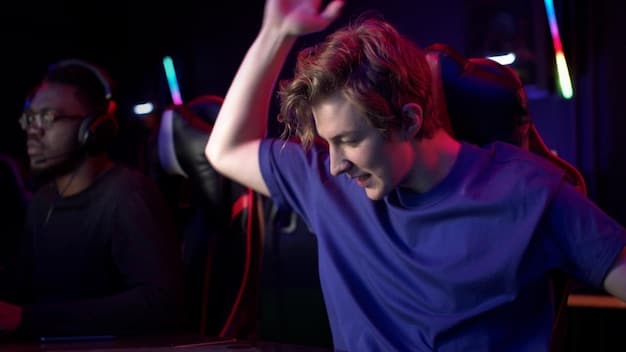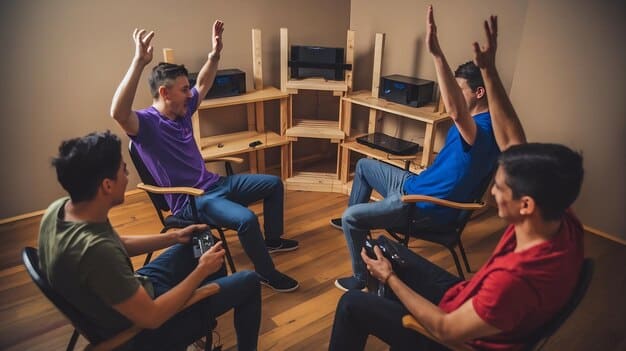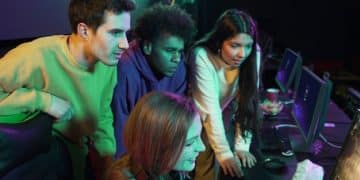Esports & Mental Health: New US Resources for 2025

Esports and mental health are increasingly linked, and in 2025, new resources are becoming available in the US to support players’ well-being, addressing issues like stress, burnout, and performance anxiety through specialized programs and support networks.
The intersection of esports and mental health is gaining significant attention, especially as the industry continues to grow. In 2025, US players can look forward to a range of new resources designed to support their mental well-being, addressing the unique challenges they face in competitive gaming.
Understanding the Mental Health Challenges in Esports
Esports is often perceived as a fun and exciting career, but it also presents significant mental health challenges for players. Competitive gaming demands long hours of practice, intense pressure to perform, and constant exposure to scrutiny.
These factors can lead to a variety of mental health issues that are increasingly being recognized and addressed within the esports community. It’s crucial to understand these challenges to effectively implement support systems.
The Pressure to Perform
The pressure to perform at a high level can be overwhelming for esports athletes. They are often judged based on their in-game statistics, win-loss records, and overall rankings. This constant evaluation can lead to anxiety, stress, and a fear of failure.
Long Hours and Burnout
Esports requires significant time commitment. Professional players often spend 10-12 hours a day practicing, strategizing, and competing. This intense schedule can lead to burnout, fatigue, and a lack of work-life balance, negatively impacting their mental health.
- Social Isolation: Spending excessive time gaming can lead to social isolation and reduced face-to-face interactions, which are vital for maintaining mental well-being.
- Sleep Deprivation: Irregular sleep patterns and sleep deprivation are common among esports players due to late-night practice sessions and tournaments.
- Physical Health Neglect: Prioritizing gaming over physical health can result in poor diet, lack of exercise, and other health-related issues that contribute to mental distress.
Recognizing these challenges is the first step toward creating a supportive environment for esports athletes. By understanding the unique stressors they face, resources can be tailored to meet their specific needs.

New Resources Available for US Esports Players in 2025
In response to the growing awareness of mental health issues in esports, a variety of new resources are being rolled out for US players in 2025. These resources aim to provide accessible and effective support to help players manage their mental well-being.
These initiatives range from specialized mental health programs to partnerships with esports organizations and the establishment of dedicated support networks.
Teletherapy and Online Counseling
Teletherapy and online counseling platforms are becoming increasingly popular, providing esports players with convenient and confidential access to mental health professionals. These platforms offer a range of services, including individual therapy, group counseling, and crisis support.
Esports-Specific Mental Health Programs
Several organizations are developing mental health programs specifically tailored to the needs of esports athletes. These programs address issues such as performance anxiety, stress management, burnout prevention, and coping with social media pressure.
- Educational Workshops: Workshops and seminars on mental health topics are being offered to esports teams and organizations, raising awareness and providing players with practical strategies for managing their mental well-being.
- Peer Support Groups: Peer support groups allow players to connect with others who understand their experiences, providing a sense of community and mutual support.
- Mental Health Coaches: Some esports teams are hiring mental health coaches to work with players on an individual and team basis, providing guidance and support to optimize their performance and mental well-being.
These resources represent a significant step forward in addressing mental health issues in esports. By making support more accessible and tailored to the unique needs of players, these initiatives can help create a healthier and more sustainable environment for competitive gaming.
The Role of Esports Organizations in Supporting Mental Health
Esports organizations play a crucial role in supporting the mental health of their players. Organizations that prioritize the well-being of their athletes can create a positive and sustainable environment that fosters both performance and mental health.
This support often involves implementing comprehensive mental health programs and fostering a culture of openness and support within their teams.
Providing Access to Mental Health Professionals
Esports organizations can provide access to mental health professionals, such as psychologists and counselors, who can offer individual therapy, group counseling, and crisis support to players. This ensures that players have access to qualified professionals who understand the unique challenges of esports.
Creating a Supportive Team Environment
Fostering a supportive team environment is essential for promoting mental well-being. Organizations should encourage open communication, teamwork, and mutual respect among players. This creates a sense of belonging and reduces feelings of isolation.
- Encouraging Work-Life Balance: Esports organizations can encourage work-life balance by promoting healthy habits, such as regular exercise, proper nutrition, and sufficient sleep.
- Reducing Stigma: Reducing the stigma associated with mental health is crucial. Organizations should create a culture where players feel comfortable seeking help without fear of judgment or discrimination.
- Promoting Mental Health Awareness: Raising awareness about mental health issues within the organization can help players recognize the symptoms of mental distress and seek help early on.
Esports organizations that prioritize mental health create a healthier and more sustainable environment for their players. This not only improves their performance but also ensures their long-term well-being.
Strategies for Esports Players to Maintain Good Mental Health
While external resources are valuable, individual players also need to develop their own strategies for maintaining good mental health. These strategies can help them cope with stress, prevent burnout, and optimize their performance.
Adopting healthy habits, practicing mindfulness, and seeking support when needed are all essential components of a comprehensive mental health plan.
Establishing Healthy Habits
Establishing healthy habits is crucial for maintaining good mental health. This includes regular exercise, proper nutrition, and sufficient sleep. These habits can improve mood, reduce stress, and boost overall well-being.
Practicing Mindfulness and Meditation
Mindfulness and meditation techniques can help players manage stress, improve focus, and enhance their overall mental well-being. These practices involve focusing on the present moment and cultivating a sense of calm and awareness.
- Time Management: Effective time management can reduce stress and improve productivity. Players should learn to prioritize tasks, set realistic goals, and avoid procrastination.
- Seeking Social Support: Seeking support from friends, family, and mentors can provide emotional support and reduce feelings of isolation.
- Setting Boundaries: Setting boundaries between gaming and personal life is essential for maintaining work-life balance and preventing burnout.
By adopting these strategies, esports players can take proactive steps to protect their mental health and thrive in the competitive gaming environment. This empowers them to manage their well-being and perform at their best.

The Future of Mental Health Support in Esports
The future of mental health support in esports looks promising, with increasing awareness and investment in resources and programs. As the industry continues to evolve, so too will the strategies and initiatives designed to support player well-being.
Innovations in technology, research, and collaboration between esports organizations and mental health professionals will drive further advancements in this field.
Integration of Technology
Technology can play a significant role in enhancing mental health support in esports. Wearable devices, biofeedback tools, and AI-powered platforms can provide personalized insights into players’ stress levels, sleep patterns, and emotional states. This data can be used to tailor interventions and provide timely support.
Research and Development
Continued research into the mental health challenges faced by esports players is essential for developing evidence-based interventions. Studies can help identify risk factors, evaluate the effectiveness of different support strategies, and inform the development of new programs.
- Collaboration: Collaboration between esports organizations, mental health professionals, and researchers is crucial for advancing the field. This partnership can facilitate the sharing of knowledge, resources, and best practices.
- Policy and Advocacy: Policy and advocacy efforts can help raise awareness about mental health issues in esports and promote the adoption of supportive policies and practices within the industry.
- Global Initiatives: Global initiatives can help standardize mental health support in esports and ensure that players around the world have access to the resources they need.
The future of mental health support in esports depends on a collaborative and innovative approach. By leveraging technology, research, and partnerships, the industry can create a supportive environment that prioritizes the well-being of its players.
Building a Healthier Esports Community
Building a healthier esports community requires a collective effort from players, organizations, sponsors, and fans. By prioritizing mental health, fostering a culture of support, and investing in resources, the community can create a more sustainable and rewarding environment for everyone involved.
This involves promoting positive values, reducing toxic behavior, and celebrating the achievements of players both on and off the virtual battlefield.
Promoting Positive Values
Promoting values such as sportsmanship, teamwork, and respect is essential for building a positive esports community. These values can help create a more inclusive and supportive environment for all participants.
Reducing Toxic Behavior
Addressing toxic behavior, such as trash-talking, harassment, and online abuse, is crucial for creating a safe and welcoming esports community. Organizations and platforms should implement policies and tools to prevent and address such behavior.
- Celebrating Achievements: Celebrating the achievements of esports players can help boost their morale and promote positive role models within the community.
- Supporting Diversity: Supporting diversity and inclusion can help create a more welcoming and equitable esports community for players of all backgrounds.
- Encouraging Open Communication: Encouraging open communication about mental health issues can help reduce stigma and promote help-seeking behavior.
By working together, the esports community can create a more positive, supportive, and sustainable environment for all its members. This collaborative approach will ensure the long-term success and well-being of the esports ecosystem.
| Key Aspect | Brief Description |
|---|---|
| 🧠 Mental Health Challenges | Discusses the stress, burnout, and performance anxiety esports players face. |
| ⚕️ New Resources in 2025 | Highlights new teletherapy, online counseling, and esports-specific programs available. |
| 🏢 Org’s Role | Explains how esports organizations support mental health through access to professionals and team environment. |
| 🎮 Player Strategies | Suggestions to players to maintain good mental health, like exercise and mindfulness practices. |
FAQ Section
▼
Esports players face challenges such as high-pressure environments, long hours, and social isolation, leading to stress, burnout, and performance anxiety. These conditions can negatively impact their mental well-being.
▼
In 2025, US esports players have access to teletherapy, online counseling platforms, and esports-specific mental health programs. These resources offer accessible and tailored support for their unique needs.
▼
Esports organizations can support their players by providing access to mental health professionals, fostering a supportive team environment, encouraging work-life balance, and reducing the stigma associated with mental health issues.
▼
Esports players can maintain good mental health by establishing healthy habits, practicing mindfulness and meditation, managing their time effectively, seeking social support, and setting boundaries between gaming and personal life.
▼
The future of mental health support in esports includes the integration of technology, continued research and development, and collaboration between esports organizations, mental health professionals, and researchers to provide comprehensive support.
Conclusion
As esports continues to evolve, the focus on mental health will become increasingly important. The new resources available for US players in 2025 represent a significant step forward, but ongoing efforts from players, organizations, and the community are essential to ensure a healthy and sustainable future for esports.





